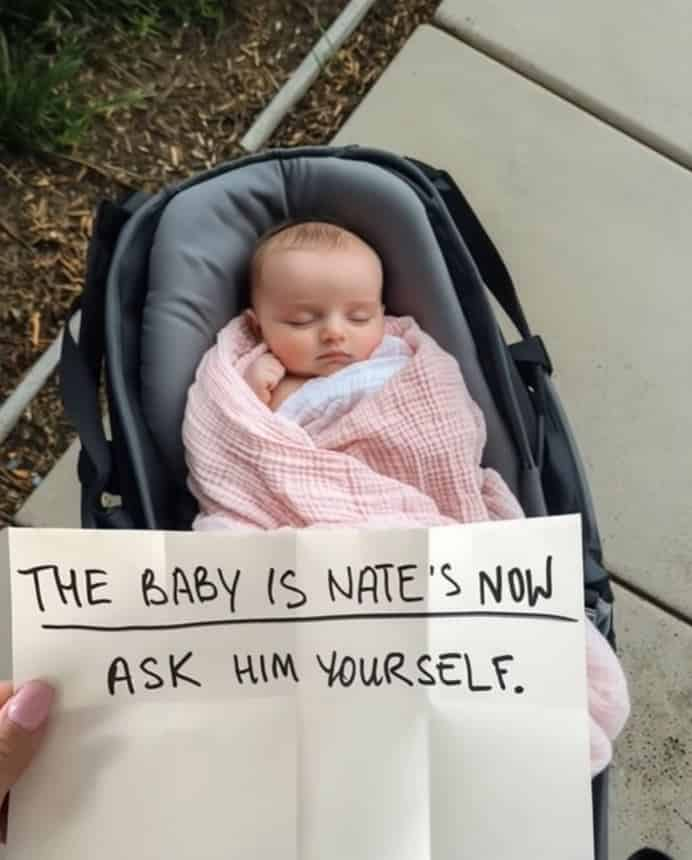It was supposed to be a quick, uneventful pizza run—nothing more. I had just wrapped up a grueling shift at the shop, my hands still slick with grease and the lingering smell of engine oil clinging to my clothes. The only thing on my mind was grabbing a large pepperoni pizza and sinking into the familiar comfort of my old couch at home. But fate, as it often does, had other plans.
As I turned into the parking lot of Salerno’s, my favorite little family-run pizzeria, my eyes caught sight of someone by the edge of the sidewalk. He was an elderly man, probably in his late seventies, struggling with a metal cane that tapped rhythmically against the pavement. He was attempting to climb the curb, inch by inch, his movements slow and deliberate. The cane clinked with each labored step, and his worn-out body swayed slightly with the effort. He wore a faded beige jacket and oversized slacks that bunched at the ankles, the cuffs nearly brushing the ground.
People bustled past him in both directions—some carrying takeout bags, others on phones, lost in their own worlds. Not one of them slowed down. They barely noticed him. It was as though he were invisible. I don’t know if it was guilt, decency, or just a deeply rooted instinct instilled in me by my parents, but something made me stop. I rolled down the window and called out, “You need a hand?”
He paused, looking over in surprise, his expression unreadable at first. Then, his face softened, and he nodded, a small smile curling the corners of his lips. He didn’t speak. He didn’t have to.
I pulled into a spot, shut off the engine, and jogged over. “Here, I got you,” I said, extending my arm. He grasped it, and I was taken aback by the strength in his grip—firm, maybe a little too firm, but it told me more about his life than words ever could. He wasn’t just leaning on me for balance; he was trusting a stranger with the weight of his frailty.
As we walked together slowly toward the entrance, I noticed his shoes. They were large, cumbersome orthopedic ones with Velcro straps—almost identical to the pair my dad used to wear. That image hit me hard. For a moment, I saw my father, standing in the kitchen in those same shoes, struggling to open a jar of pickles. I remembered how he’d get frustrated, muttering under his breath but pretending like nothing was wrong. He hated asking for help, even when he needed it.
When we stepped inside Salerno’s, the warm, savory aroma of garlic, tomatoes, and fresh basil enveloped us. The cozy little place buzzed with life, families and couples laughing over red-and-white checkered tables. A hostess, a young woman with curly dark hair and kind eyes, looked up and immediately smiled. “Hey, Mr. Benning. Usual table?”
Mr. Benning chuckled. “Not alone today,” he replied, then glanced at me. “You hungry, son?”
I didn’t know how to respond. I hadn’t expected this. I was just there for pizza, not companionship. But something in his tone made it clear—this wasn’t just about a meal.
We took a booth in the corner, soft lighting casting gentle shadows over the wood-paneled walls. The warmth of the space, the clatter of dishes, and the gentle hum of conversation melted away my fatigue. When the garlic bread arrived, crispy and golden with flecks of parsley, I realized I hadn’t even looked at the menu. Mr. Benning had already ordered for us: two margherita pizzas. It was oddly comforting. He acted like he’d known all along that I wouldn’t refuse.
“You’re probably wondering why I invited you,” he said after we’d settled in and taken a few bites. His voice was calm, but there was something beneath the surface—an ache, maybe.
“Yeah, kinda,” I admitted. “Thanks for the food, but…”
He raised a hand, stopping me. “Let me tell you a story first. Ever heard of ‘pay it forward’?”
Of course I had. Who hadn’t? But hearing it from this elderly stranger across from me in a threadbare cardigan gave the phrase a different weight. It sounded less like a trend and more like a legacy.
“My boy used to say that all the time,” Mr. Benning continued. His eyes glazed slightly, as though he were looking not at me but through time. “Whenever I thanked him for something—shoveling snow, fixing the porch light—he’d just smile and say, ‘Nah, just pay it forward.’” His lips twitched into a bittersweet smile. “That kid grew up fast. Too fast. He worked two jobs while going to school. Helped me pay the mortgage when things got tough. Never once complained.”
I listened quietly, moved by the raw affection in his voice. I could hear a similar pride and sorrow that I’d once recognized in my own father’s voice.
“One day,” he said, voice faltering, “he pulled over to help a stranger fix a flat tire. Just like that. Didn’t hesitate. That was the kind of kid he was. A few days later… a drunk driver hit him. Killed him instantly.”
My chest tightened. The air in the booth seemed denser. I couldn’t find words that felt sufficient—‘Sorry’ felt too small. ‘Thank you’ felt out of place.
“He believed in paying it forward,” Mr. Benning went on, after a long pause. “So now, I do what I can to honor that. When someone shows me kindness, I pass it on. Tonight, that was you—helping an old man get inside for dinner.”
It hit me then. The pizza, the conversation—none of it was coincidence. He had orchestrated this. My eyes burned as I swallowed the knot rising in my throat.
After the meal, Mr. Benning insisted on walking me to my car. I offered to drive him home, but he declined with a warm smile. “Nope. My ride’s coming. I live just a few blocks down.”
As we stood by my car, he reached into his coat pocket and handed me a small envelope. “Take this,” he whispered.
I looked at him, confused. “What’s this?”
“Gift card,” he said. “Groceries, gas, whatever you need. Just promise me one thing—pay it forward.”
I tried to object, to tell him I couldn’t accept charity, but he raised a hand again. “Don’t argue. Just promise. When the time comes, help someone. That’s how we keep goodness alive.”
I nodded, heart full, not entirely sure I understood the magnitude of what he was asking, but I promised anyway.
The next morning, as I sat on my couch with a lukewarm cup of coffee, I found myself thinking of Mr. Benning—and of my father. They weren’t the same man, but they shared something unspoken: dignity, resilience, pride. Both had lived lives of quiet strength, rarely asking for help, even when the weight became unbearable.
After my mother died, Dad had remarried and moved a few states away. We talked, sure—but not often, and not deeply. I used to idolize him. He was the guy who fixed my bike, built me a treehouse, made ridiculous puns at dinner. But somewhere along the way, we drifted. He became distant. I became distant.
That afternoon, I picked up the phone and called him. Not out of guilt. But because Mr. Benning reminded me how easy it is to forget the people who shaped us.
“Everything okay, son?” Dad asked, his voice scratchy and surprised.
“Yeah,” I said, unsure how to begin. “Just… checking in. Seeing how things are.”
There was a pause. Then he chuckled softly. “Well, aren’t you full of surprises.”
We talked for nearly an hour—about his job, his tomatoes, even the damn weather. It wasn’t a life-changing conversation. But it felt like a step back toward something lost.
Weeks passed. One day I drove past Salerno’s again, and on impulse, pulled in. The hostess recognized me. “Looking for Mr. Benning?” she asked with a knowing smile.
“Yeah,” I said, hopeful.
She shook her head. “Haven’t seen him lately. But he usually comes in on Tuesdays.”
I left disappointed. But outside, I spotted an older woman struggling with groceries. Without thinking, I rushed over and offered to help. She smiled gratefully. “You’re a kind soul,” she said. “These bags are heavier than they look!”
Her name was Margaret. As we walked to her car, she mentioned coming to Salerno’s every Tuesday with a friend—Mr. Benning. It made sense. She was his ride.
“You know Mr. Benning?” I asked casually.
“Of course,” she beamed. “Sweetest man. Always says he’s amazed by how kind strangers can be.”
Her words lingered. I realized then—I wasn’t just part of his story. I was continuing it.
In the months that followed, I paid it forward in small ways. Fixed a flat tire for a coworker. Bought coffee for a stranger. Called my dad more often. Each act, though simple, felt like tossing pebbles into a pond. I couldn’t see the ripples, but I trusted they were there.
Then one day, a letter arrived—no return address, just my name in neat handwriting.
Dear Friend,
I hope you’re well. Life has its twists, doesn’t it? Some people pass through our lives and leave a lasting impression. You reminded me of my son—not because you’re the same, but because of the goodness in your heart. Keep spreading that light. The world needs more of it.
With gratitude,
Mr. Benning
I read it twice. Then carefully folded it and placed it in my wallet.
Sometimes, the most profound lessons come not from books or speeches, but from chance encounters. Mine came from an old man with a cane and a broken heart—who taught me that kindness isn’t just an act. It’s a legacy.
So if someone’s compassion ever touched your life—don’t just say thank you.
Pay it forward. You never know who’s watching. Or who might need it most.
 Breaking News
Breaking News























